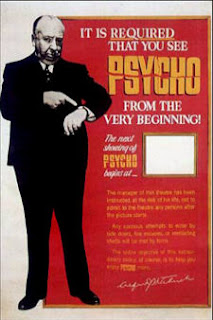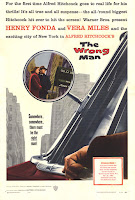The "Now I've Seen Everything" Dept.- Alfred Hitchcock IV
 Alfred Hitchcock and Bernard Herrmann-Masters of Suspense
Alfred Hitchcock and Bernard Herrmann-Masters of Suspense(Thank you and have a nice day)
 t film of Hitchcock's Paramount contract (though rights were eventually bought by Universal), it was made on-the-cheap using his production crew from television because he was unsure of its box-office potential, in fact, he wasn't sure of the film at all. Yet, it is Hitchcock at his most strategic in its blueprint--it is a series of film feints and manipulations designed to keep its audience on the edge of their seats, questioning everything. In his landmark book-length interview with Francois Truffaut, Hitchcock was particularly pleased with "Psycho," because he made it so cheaply and yet it generated the biggest box-office of his career. He also enjoyed the effect it had on audiences, as, more than any other film, he was deliberately "playing the audience like an orchestra." The story is simple, though its strategies are not. We follow Marion Crane, a Phoenix career girl who has just embezzled $40,000 from her boss to help set up her and her boyfriend. She suffers a crisis of conscience and before she can act on it, she is brutally murdered in the shower of the motel she is staying at. The young proprietor of the Bates Motel, Norman Bates, discovers the body and hides all evidence of the killing to protect his mother, then must ward off detectives, police and Marion's sister and beau from discovering the truth.
t film of Hitchcock's Paramount contract (though rights were eventually bought by Universal), it was made on-the-cheap using his production crew from television because he was unsure of its box-office potential, in fact, he wasn't sure of the film at all. Yet, it is Hitchcock at his most strategic in its blueprint--it is a series of film feints and manipulations designed to keep its audience on the edge of their seats, questioning everything. In his landmark book-length interview with Francois Truffaut, Hitchcock was particularly pleased with "Psycho," because he made it so cheaply and yet it generated the biggest box-office of his career. He also enjoyed the effect it had on audiences, as, more than any other film, he was deliberately "playing the audience like an orchestra." The story is simple, though its strategies are not. We follow Marion Crane, a Phoenix career girl who has just embezzled $40,000 from her boss to help set up her and her boyfriend. She suffers a crisis of conscience and before she can act on it, she is brutally murdered in the shower of the motel she is staying at. The young proprietor of the Bates Motel, Norman Bates, discovers the body and hides all evidence of the killing to protect his mother, then must ward off detectives, police and Marion's sister and beau from discovering the truth. of the way for the MGM lion's roar. Then, life goes crazy for a very bad couple of days in the life of blithely selfish Madison Avenue ad-man Roger O.Thornhill ("What does the 'O' stand for?" "Nothing...") as he is mistaken for a government agent, kidnapped, nearly assassinated and then is accused of murdering a U.N. official. He then falls under the wing of the very government service his phantom doppelganger belongs to, evading the police and the spies on a cross-country getaway from New York to North Dakota.
of the way for the MGM lion's roar. Then, life goes crazy for a very bad couple of days in the life of blithely selfish Madison Avenue ad-man Roger O.Thornhill ("What does the 'O' stand for?" "Nothing...") as he is mistaken for a government agent, kidnapped, nearly assassinated and then is accused of murdering a U.N. official. He then falls under the wing of the very government service his phantom doppelganger belongs to, evading the police and the spies on a cross-country getaway from New York to North Dakota.  detective on disability following a traumatizing incident that involved a dead policeman and revealed a susceptibility to vertigo--a dizzying sensation in situations dealing with heights. An old friend hires him to follow his wife whom he suspects of falling under the spell of a dead woman who committed suicide. "Scottie" takes the job, and in following the woman, learns of her obsession, rescues her from an attempt to take her life...and falls hopelessly in love with her. But in an attempt to jog her memory she makes a second attempt which he is unable to prevent due to his infirmity. The guilt and grief (plus an embarrassing investigation) lands "Scottie" in a sanitarium, a broken man. When he is released, vulnerable and impressionable, he obsesses on a woman who resembles the dead woman and finds himself unable to shake the grip of his lost love.
detective on disability following a traumatizing incident that involved a dead policeman and revealed a susceptibility to vertigo--a dizzying sensation in situations dealing with heights. An old friend hires him to follow his wife whom he suspects of falling under the spell of a dead woman who committed suicide. "Scottie" takes the job, and in following the woman, learns of her obsession, rescues her from an attempt to take her life...and falls hopelessly in love with her. But in an attempt to jog her memory she makes a second attempt which he is unable to prevent due to his infirmity. The guilt and grief (plus an embarrassing investigation) lands "Scottie" in a sanitarium, a broken man. When he is released, vulnerable and impressionable, he obsesses on a woman who resembles the dead woman and finds himself unable to shake the grip of his lost love.Alfred Hitchcock's "The Wrong Man" (1956) One is tempted to say this one's surprising, but Hitchcock was never one to do something that wasn't
 unique. In this "kitchen-sink" neo-noir adapted by playwright Maxwell Anderson, Hitchcock tells the true story (the court case number is even displayed on the poster for the doubters to research) of "Manny" Ballestrero, a musician at New York's "Stork Club," who was falsley accused of assault and robbery and his years-long struggle to clear his name. Because the story is itself "stranger than fiction," Hitchcock films it in an almost documentary fashion in many of the actual locations (and with some of the people involved in the story!) **** It's a realistic version of the standard Hitchcock story elements of false accusation and imprisonment, and the guilt associated with those events. A highlight of the film (and bear in mind when you see it, that it actually happened the way it was depicted) is the trial as Ballestrero furtively glances about the court-room at the casual indifference of the participants and spectators, while he is fighting for his life. Henry Fonda is such an "every-man" actor that any star-persona is completely submerged, and Vera Miles gives an incredible performance as his long-suffering wife (this, and "Vertigo" are good, unhysterical depictions of depression) Anthony Quayle plays their defense attorney.
unique. In this "kitchen-sink" neo-noir adapted by playwright Maxwell Anderson, Hitchcock tells the true story (the court case number is even displayed on the poster for the doubters to research) of "Manny" Ballestrero, a musician at New York's "Stork Club," who was falsley accused of assault and robbery and his years-long struggle to clear his name. Because the story is itself "stranger than fiction," Hitchcock films it in an almost documentary fashion in many of the actual locations (and with some of the people involved in the story!) **** It's a realistic version of the standard Hitchcock story elements of false accusation and imprisonment, and the guilt associated with those events. A highlight of the film (and bear in mind when you see it, that it actually happened the way it was depicted) is the trial as Ballestrero furtively glances about the court-room at the casual indifference of the participants and spectators, while he is fighting for his life. Henry Fonda is such an "every-man" actor that any star-persona is completely submerged, and Vera Miles gives an incredible performance as his long-suffering wife (this, and "Vertigo" are good, unhysterical depictions of depression) Anthony Quayle plays their defense attorney..jpg) Herrmann's second score for Hitchcock is a bumptuous affair emphasizing thrills over atmosphere and Herrmann even appears on-screen as the conductor of Arthur Benjamin's cantata "The Storm Clouds" (which was written for the 1934 film). It's a fine Hitchcock thrill ride, one of the five Hitchcock films that were wholly owned by Hitch (the others were "Rope," "Rear Window," "The Trouble with Harry," and "Vertigo") and held as a legacy for his daughter, Pat.
Herrmann's second score for Hitchcock is a bumptuous affair emphasizing thrills over atmosphere and Herrmann even appears on-screen as the conductor of Arthur Benjamin's cantata "The Storm Clouds" (which was written for the 1934 film). It's a fine Hitchcock thrill ride, one of the five Hitchcock films that were wholly owned by Hitch (the others were "Rope," "Rear Window," "The Trouble with Harry," and "Vertigo") and held as a legacy for his daughter, Pat. rroundings, and no matter how charming its people, a corpse can do a lot to upset things. While out playing "spaceman," young Arnie Rogers (played by a pre-"Beaver" Jerry Mathers) comes across something totally out of his orbit--a dead body. Gunshots had been heard, and maybe "Harry" was felled by one by accident. Or something else happened. Harry's former wife, Jennifer, certainly had a motive. And then there's the little matter of the body always turning up, inconveniently. Pretty soon, people are feeling guilty about Harry, even if they had nothing to do with it. And it's up to the most un-bohemian of bohemian artists--Sam Marlowe to get to the bottom of the mystery...or at least keep it buried for awhile. Call it a black comedy of manners or call it an Agatha Christie novel, but moved out the dark drawing room into the bright sunshine and fall-colors of the outside, it's Hitchcock in a whimsical mood by way of Charles Addams. His cast includes veterans Midred Natwick and Edmund Gwenn and representing romance on the other side of the age scale John Forsythe and Shirley MacLaine (in her film debut). Hitchcock and Robert Burks do an incredible job photographing the New England autumn capturing the golden light filtering through the trees, showing just how beautiful things can look when they're dying.
rroundings, and no matter how charming its people, a corpse can do a lot to upset things. While out playing "spaceman," young Arnie Rogers (played by a pre-"Beaver" Jerry Mathers) comes across something totally out of his orbit--a dead body. Gunshots had been heard, and maybe "Harry" was felled by one by accident. Or something else happened. Harry's former wife, Jennifer, certainly had a motive. And then there's the little matter of the body always turning up, inconveniently. Pretty soon, people are feeling guilty about Harry, even if they had nothing to do with it. And it's up to the most un-bohemian of bohemian artists--Sam Marlowe to get to the bottom of the mystery...or at least keep it buried for awhile. Call it a black comedy of manners or call it an Agatha Christie novel, but moved out the dark drawing room into the bright sunshine and fall-colors of the outside, it's Hitchcock in a whimsical mood by way of Charles Addams. His cast includes veterans Midred Natwick and Edmund Gwenn and representing romance on the other side of the age scale John Forsythe and Shirley MacLaine (in her film debut). Hitchcock and Robert Burks do an incredible job photographing the New England autumn capturing the golden light filtering through the trees, showing just how beautiful things can look when they're dying.
"The Master of Suspense" can't keep his own composer awake...
Hitchcock and Herrmann in happier times
* "Of Marginal Interest" are two very important video's: one, the first episode of "Alfred Hitchcock Presents," a truly creepy tale unmistakably directed by the Master himself; the other an excellent documentary on Hitchcock's musical muse, Bernard Herrmann. Herrmann doesn't come off very well in this (and he rather deserves it), but Hitchcock's treatment of him is treated with contempt--"Hitchcock had the loyalty of an eel," sneers the usually very gentlemanly David Raksin.
** The director's was the lovely and very creepy "Shadow of a Doubt" written with Thornton Wilder. We'll get there, eventually.
*** And the director makes the point with the "Vertigo" shot, which he'd been trying to perfect since "Rebecca," a simultaneous zoom-in, and track-back that prismatically warps space--it has been used endlessly by directors trying to convey disorientation or shock. Hitchcock never used it again--he kept coming up with new innovations.
**** Herrmann's score is similarly muted, more textural--to be felt rather heard--not unlike his final score, "Taxi Driver," twenty years later--and only "breaks out" as source music at the Club.








2 comments:
Great post! It's made me think of having a Hitchcock movie marathon.
Take care,
www.cinephilemagazine.com
Thanks for the comment, Richard!
Check out his excellent site, there's a lot of very good writing on it and an eclectic range of cinema interests.
Post a Comment